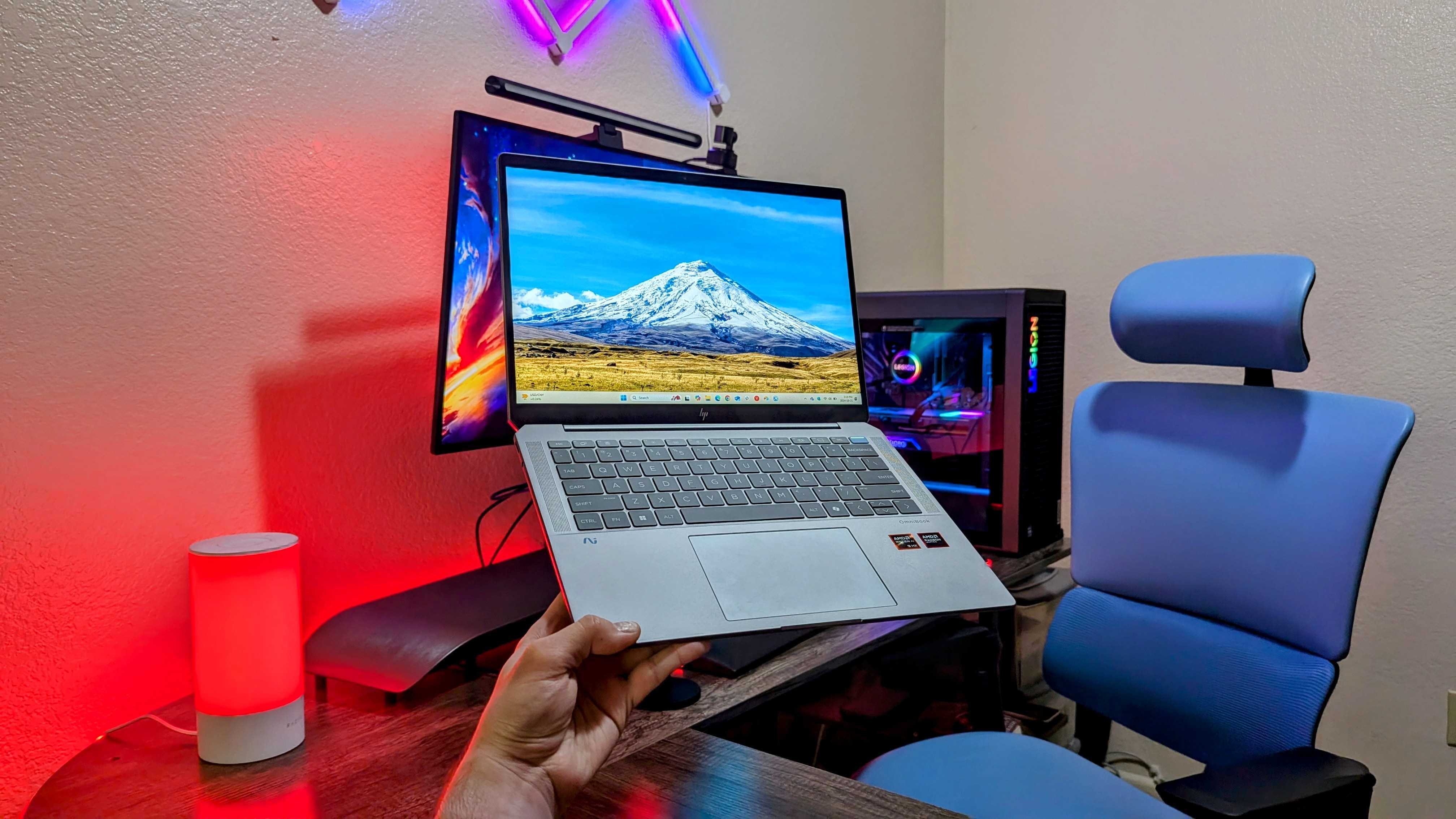
As a tech enthusiast who has reviewed countless laptops over the years, I must say that the HP OmniBook Ultra 14 is a solid choice for those seeking above-average performance and endurance. However, it’s not the laptop that will blow your mind with its design or display.
Following HP’s complete overhaul of their consumer brand, the 14-inch OmniBook Ultra emerges as part of a two-part flagship approach. While it maintains a conventional clamshell design, this laptop prioritizes exceptional performance over versatility, unlike its sibling, the OmniBook Ultra Flip, which offers a 2-in-1 design.
The result is a solid and dependable Windows laptop that looks boring on the outside but contains magic on the inside. AMD’s latest Ryzen AI chipsets are incredibly capable and the OmniBook Ultra 14 is well-equipped to take advantage, resulting in a beautiful combination of performance and battery life. On top of that, the OmniBook Ultra deviates from the crowd with full-fledged Thunderbolt ports on an AMD-powered device and the first arrival of HP’s trusted Wolf Security suite on a consumer device.
Despite its basic design and mediocre screen, which fail to reflect its high-end pricing, this HP laptop has several commendable features. However, HP’s focus on AI and the upcoming Copilot+ PC update, while promising, seems less compelling in this model compared to their EliteBook X enterprise release. There’s a lot to discuss about this HP laptop, although it may not be the most captivating one I’ve reviewed so far.
OmniBook Ultra 14: Pricing and specifications
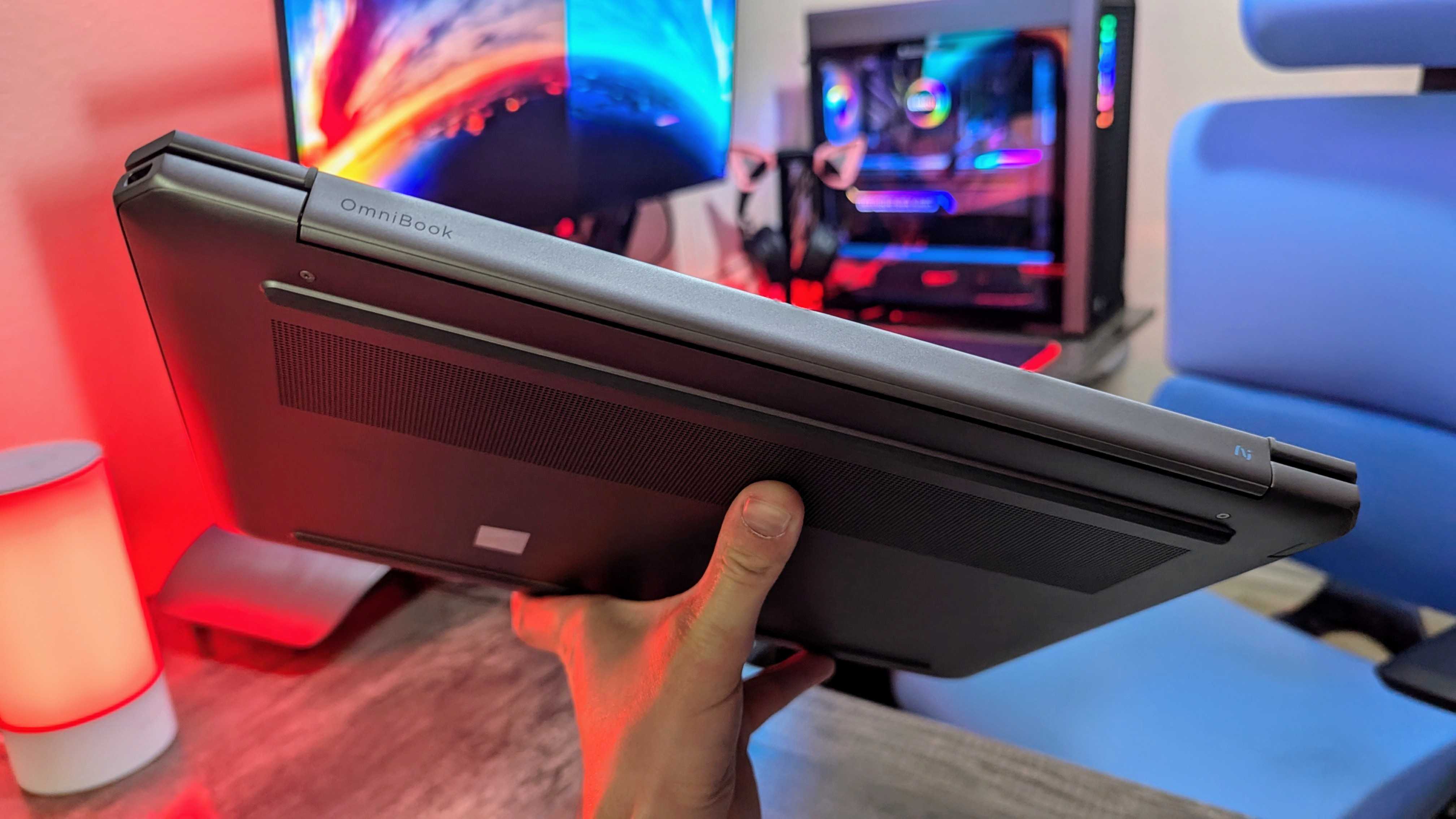
Pricing highlights
- The HP OmniBook Ultra 14 starts at $1,350, with an AMD Ryzen AI 9, 16GB of RAM, and 512GB of SSD storage.
- There are few configuration options for this laptop, with an upgraded Ryzen AI 9 CPU, 32GB of RAM, and 2TB of SSD storage being your max.
- This laptop clearly focuses more on its performance than anything else, and in some ways doesn’t feel like its price.
- Value rating: ⭐⭐⭐½
2024’s HP OmniBook Ultra 14 model boasts an optional, potent AMD Ryzen AI 9 HX 375 processor, setting it apart from models like the ASUS ProArt P16 (2024), primarily due to its more capable Neural Processing Unit for AI tasks. Essentially, this laptop emphasizes high-performance in a compact design, and AMD’s recent improvements in efficiency result in battery life that’s surprisingly long-lasting.
You have the flexibility to customize your HP OmniBook Ultra 14, with prices starting from $1,349.99 directly from HP. However, the basic configuration comes equipped with a Ryzen AI 9 HX 365 processor featuring two fewer cores, along with only 16GB of RAM and 512GB of SSD storage. If you wish to enhance its capabilities, your choices are limited to upgrading the processor, memory, and storage. The highest configuration available is priced at $1,689.99 on Best Buy, featuring the Ryzen AI 9 HX 375 processor, 32GB of RAM, and 2TB of SSD storage, which was the specific model I reviewed (with Windows 11 Pro instead of Home).
In terms of performance, the OmniBook Ultra 14 functions similarly to a top-tier Windows laptop; however, its overall feel doesn’t quite match up. Regarding design, screen quality, and additional features, they remain consistent across all models, leaving you to choose which processor and memory/storage combination best suits your needs.
Inside the container, you’ll discover the HP OmniBook Ultra 14 (2024) model along with a 65W USB Type-C power adapter featuring a braided cable. The laptop comes with the usual HP 1-year Limited Warranty protection.
OmniBook Ultra 14: Design and build quality
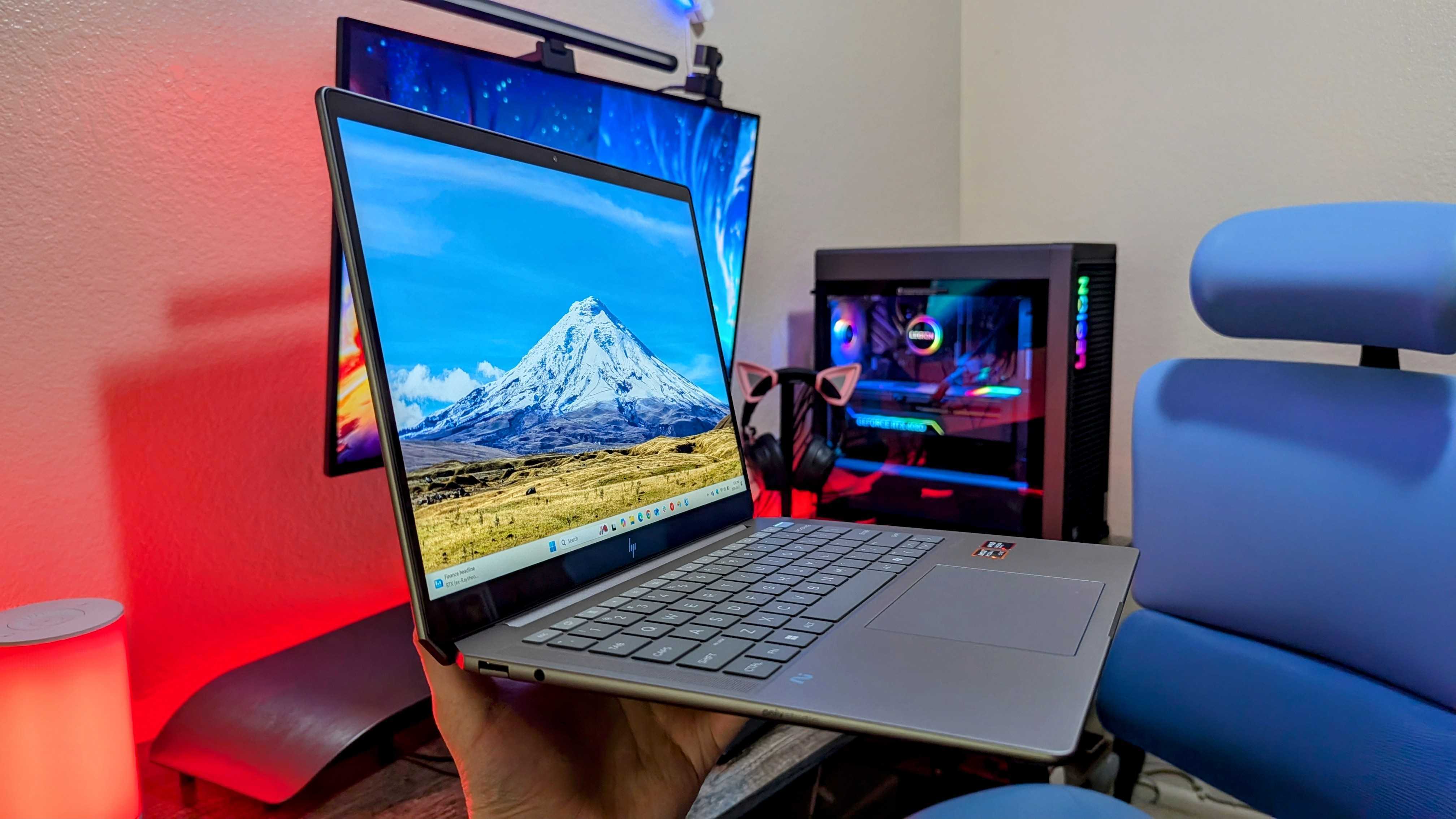
Design highlights
- The OmniBook Ultra 14 takes design cues from the previous Spectre devices with an all-metal chassis and cut corners.
- While this laptop is decently thin and light with solid build quality, it just doesn’t feel quite like its price suggests.
- It’s a boring overall design with outdated display bezels, and the construction isn’t as refined as prior HP flagship laptops.
- Design rating: ⭐⭐⭐½
I have a strong affection for several HP laptop models, yet it’s hard to ignore (and it’s a bit disappointing) that the company has shifted towards more conventional design choices as time goes on. The vibrant metallic hues and intricate gem-cut casings, once signature features, have been gradually replaced by minimalism, leading to the creation of the HP OmniBook Ultra 14.
With dimensions of 16.5mm thick and weighing 3.47lbs, this laptop isn’t the smallest or lightest on the market, but it still holds its ground as a “thin-and-light Ultrabook.” However, there’s an uninteresting quality to its design that leaves it feeling somewhat ordinary. The OmniBook Ultra struggles to stand out among its peers, and its slightly tapered corners, while a thoughtful touch, are not enough to make it truly distinctive at this point in time.
To put it simply, this laptop isn’t unattractive; rather, I find it somewhat dull compared to the HP EliteBook X 14 (G1a). The latter shares numerous features with the OmniBook Ultra 14, but despite its increased thickness, its design is more streamlined, lighter, and offers a greater variety of aesthetically pleasing aspects than the OmniBook Ultra.
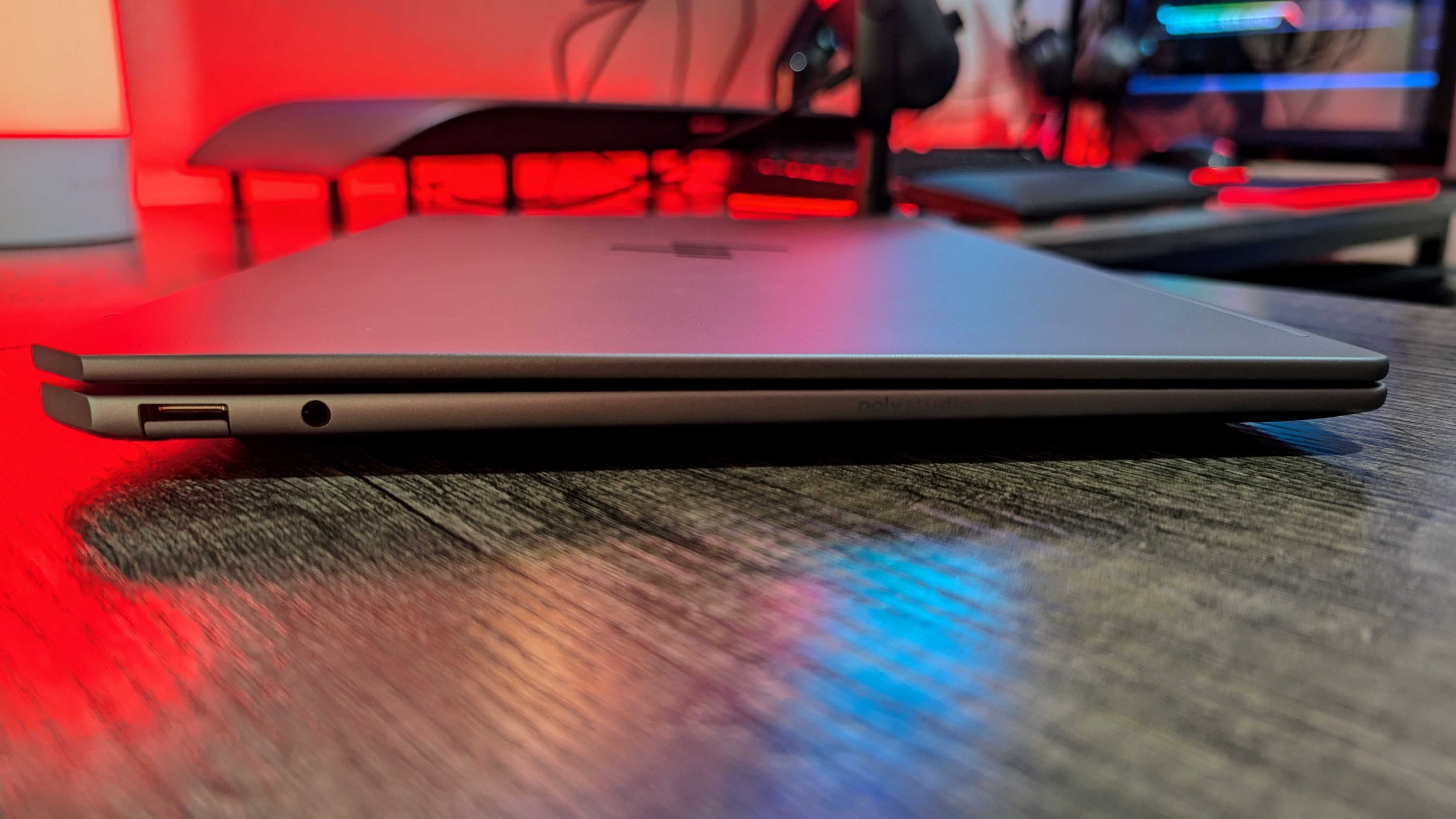
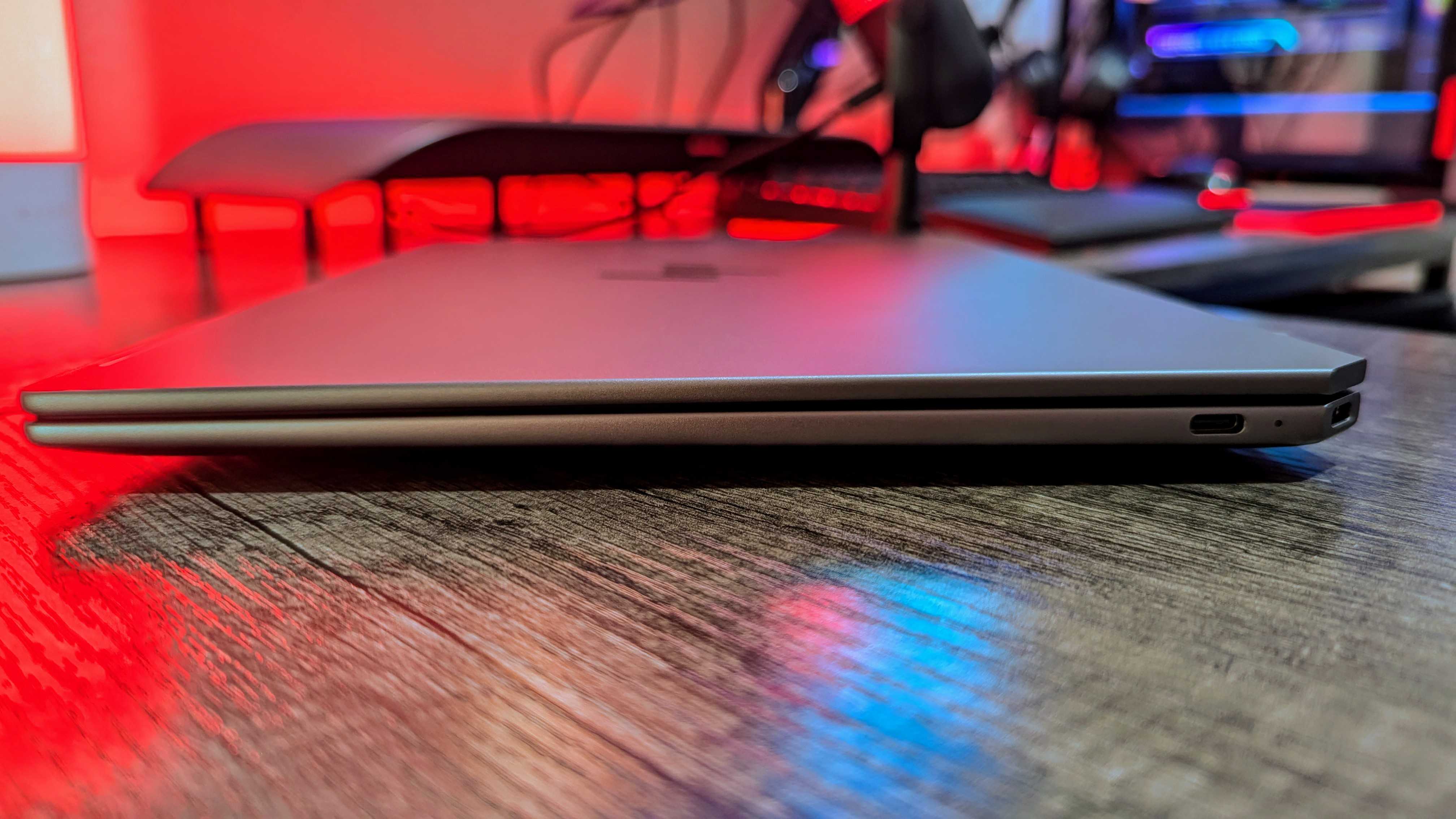
Despite its solid construction, the overall build quality of this HP laptop seems to fall short of justifying its price tag, which is over $1,300. The display bezels appear dated compared to most high-end Windows laptops, and the hinge can creak when opened. Additionally, the keyboard deck flexes under pressure, and the bottom panel may produce a strange, sharp creaking sound when lifted with any force. Although it’s built to last, the refinement typically associated with such expensive devices seems lacking in this model.
The port selection is a little bit of a mixed bag, too. It’s true, this is one of the few AMD-powered laptops that boasts true Thunderbolt 4 ports, and you actually get two here. That’s great! On the other side, though, you’ll find nought but a 3.5mm audio jack and HP’s finicky drop jaw USB Type-A port. T4 ports are awesome to have if you can make use of them, but I think most people would rather have another USB port or HDMI port (the EliteBook X has both of those, by the way).
OmniBook Ultra 14: Display quality
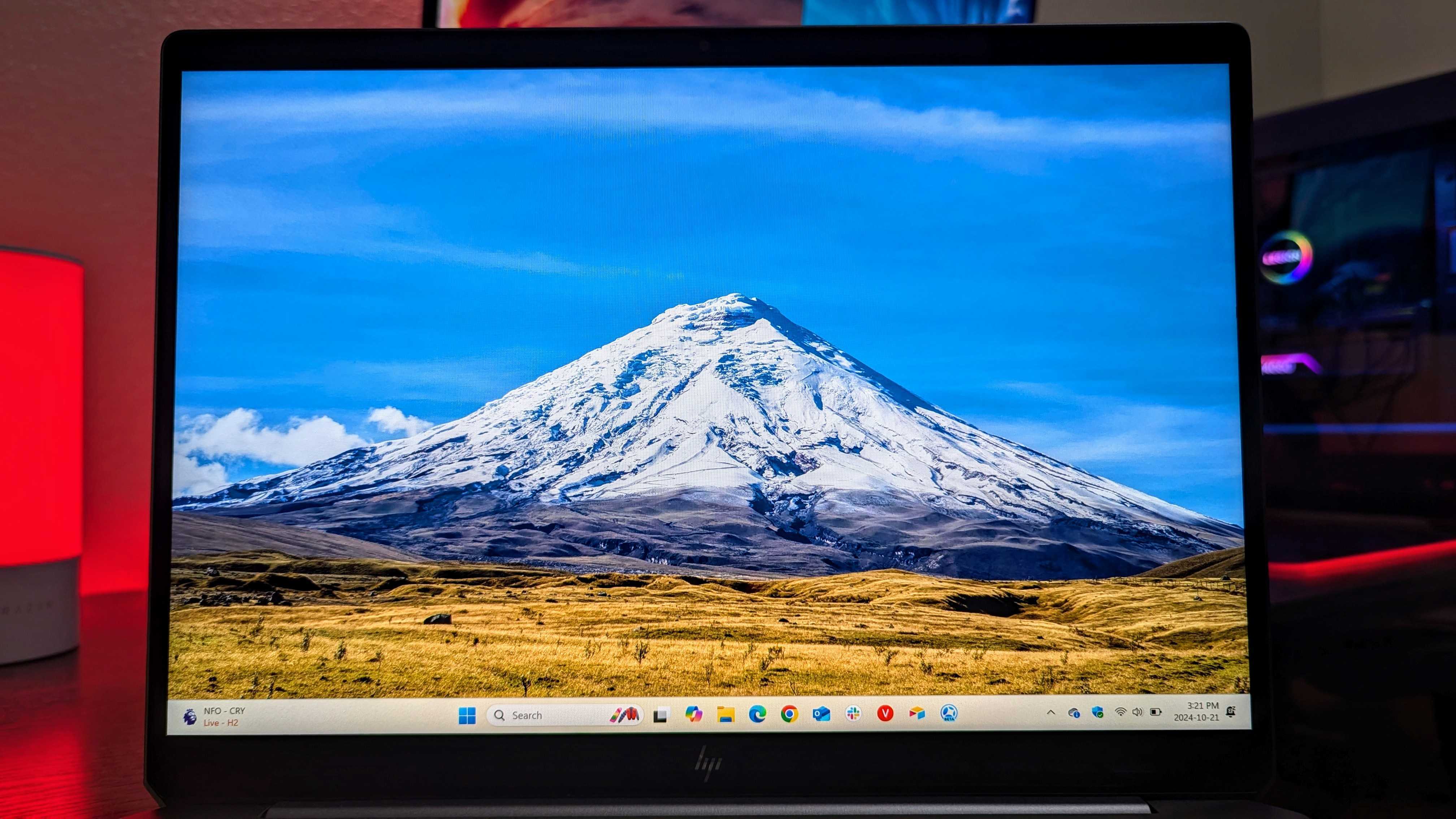
Display highlights
- The OmniBook Ultra’s 14-inch IPS LCD display is decent, but that’s all it is.
- Thick bezels, the feeling of a gap between the display and glass screen, and flat colors make it look bland.
- It’s serviceable in terms of color accuracy, brightness, and resolution, but nothing about this display is exciting.
- Display rating: ⭐⭐⭐
Frankly, I find this screen quite displeasing. It’s not about HP choosing an IPS LCD panel over OLED screens, which are popular in premium laptops (even though having that option would be preferable). There are many outstanding IPS LCD displays available on laptops, and one of my favorites is the screen on the HP ZBook Firefly 14 (G10), a laptop I reviewed. That screen was bright, color-accurate, vivid, and simply a joy to look at.
Instead, compared to the OmniBook Ultra, other displays might seem more vibrant and appealing. It’s reminiscent of a budget Windows laptop from three years back, priced under $800. In reality, its 14-inch, 2.2K IPS LCD screen is nothing extraordinary; it’s just average, or as some might say, mediocre.
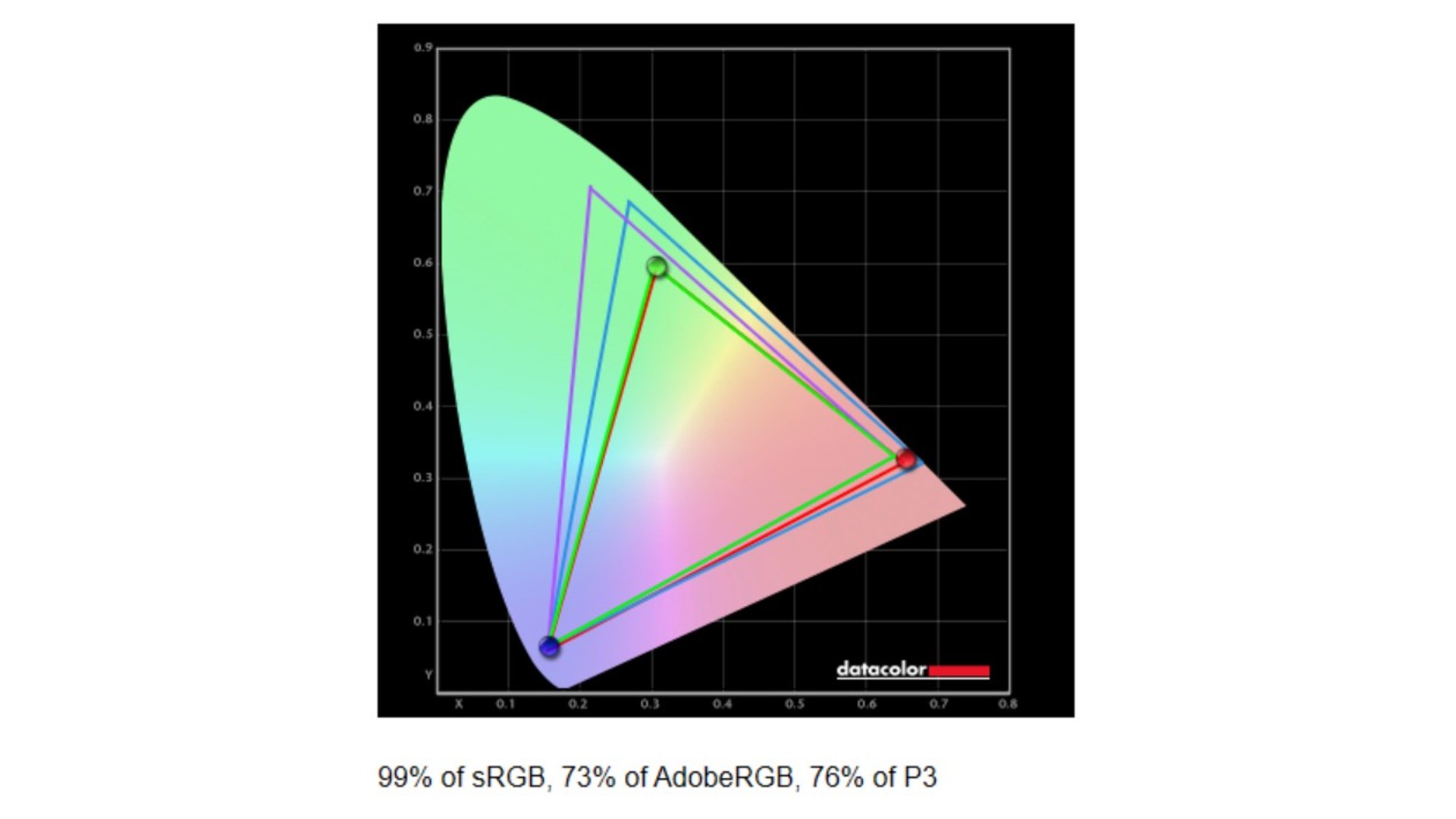
In testing, this screen stands out for its good contrast ratios among IPS LCD panels and its exceptional, balanced white tone. Additionally, HP claims it is energy efficient, a claim that seems valid based on the laptop’s overall battery life. However, beyond these points, my praise for the display is limited.
Regarding color accuracy, the OmniBook Ultra doesn’t quite meet the 100% sRGB color gamut HP advertises and falls short compared to Adobe RGB and DCI-P3 color gamuts; overall, colors appear less vibrant. The maximum brightness of 400nits is difficult to achieve, and even at full brightness, the OmniBook Ultra seems dimmer than OLED displays with similar reported brightness levels. This discrepancy can be partly attributed to differences in how brightness is perceived between backlit LCD and direct OLED screens, but it’s not just that.
As a analyst, I can tolerate the chunkier-than-usual bezels, considering they allow for a stronger front-facing camera, yet the OmniBook Ultra 14 presents an unusual sensation of distance between the display and the screen glass. This spatial disconnect makes the screen seem recessed, which is uncomfortable, given my familiarity with laminated screens in contemporary devices. The display on the OmniBook Ultra functions adequately for daily productivity tasks and web browsing, but it lacks the enjoyment factor – it’s strictly functional.
OmniBook Ultra 14: Performance and thermals
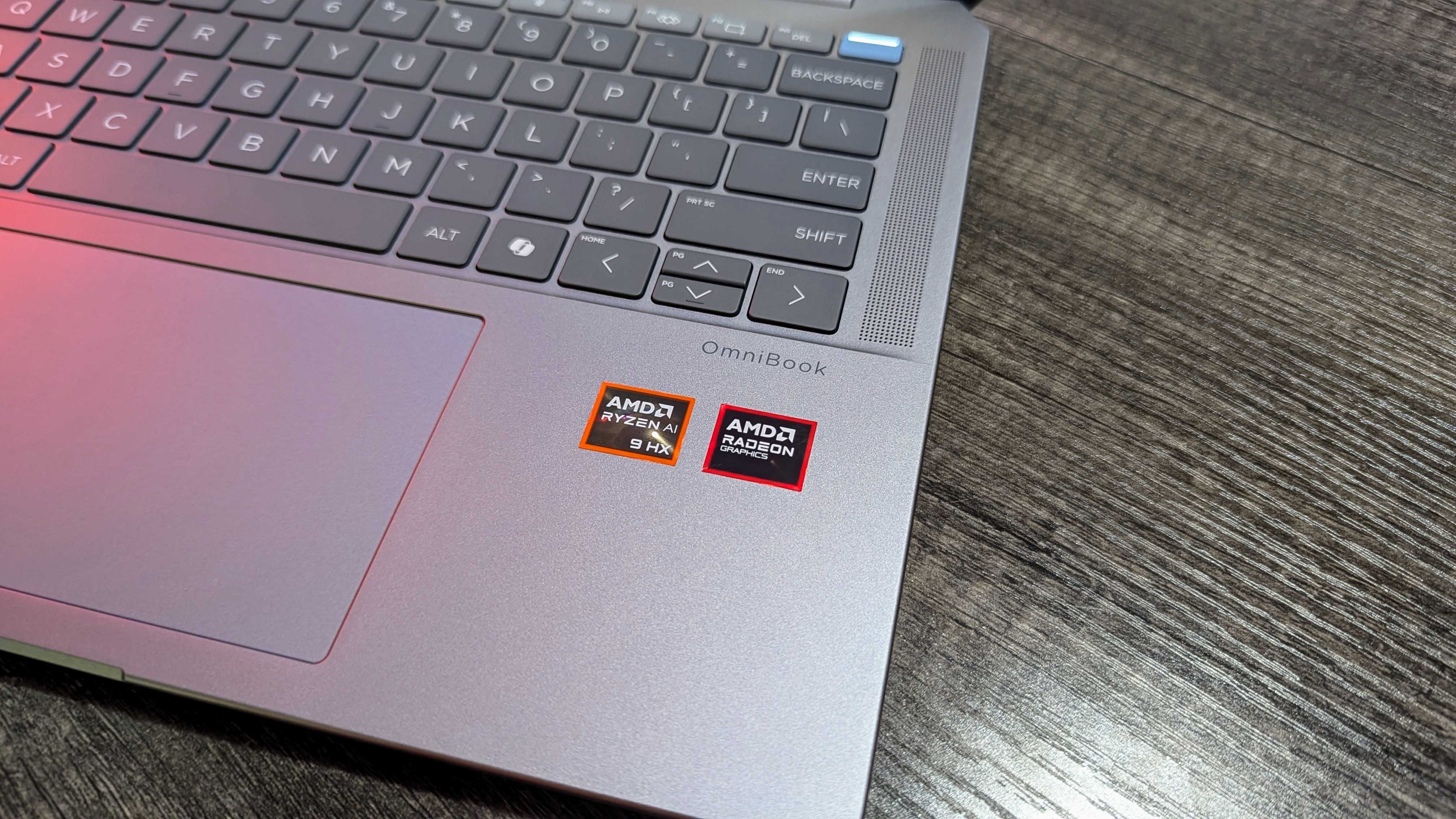
Performance highlights
- The OmniBook Ultra is a prime example of just how good modern silicon has gotten between AMD, Intel, and Qualcomm.
- The Ryzen AI 9 inside this laptop is a very strong and reliable performer in every category.
- This laptop can get quite warm, but still does a great job avoiding performance drops.
- Performance rating: ⭐⭐⭐⭐⭐
The HP OmniBook Ultra 14 is equipped with one of the most potent mobile processors available in laptops currently, specifically the Ryzen AI 9 HX 375. This processor shares many similarities with those found in top-tier AMD laptops such as the Ryzen AI 9 HX 370, but it boasts an extra 5 TOPS of AI computational power through its integrated Neural Processing Unit (NPU).
It’s essential to note that this 12-core chipset delivers exceptional performance while maintaining a cool and efficient operation, which is the ideal combination for any laptop. While Intel Evo laptops may have an edge when it comes to swiftly waking from sleep mode, in every other aspect, the OmniBook Ultra 14 can hold its own against the very best.
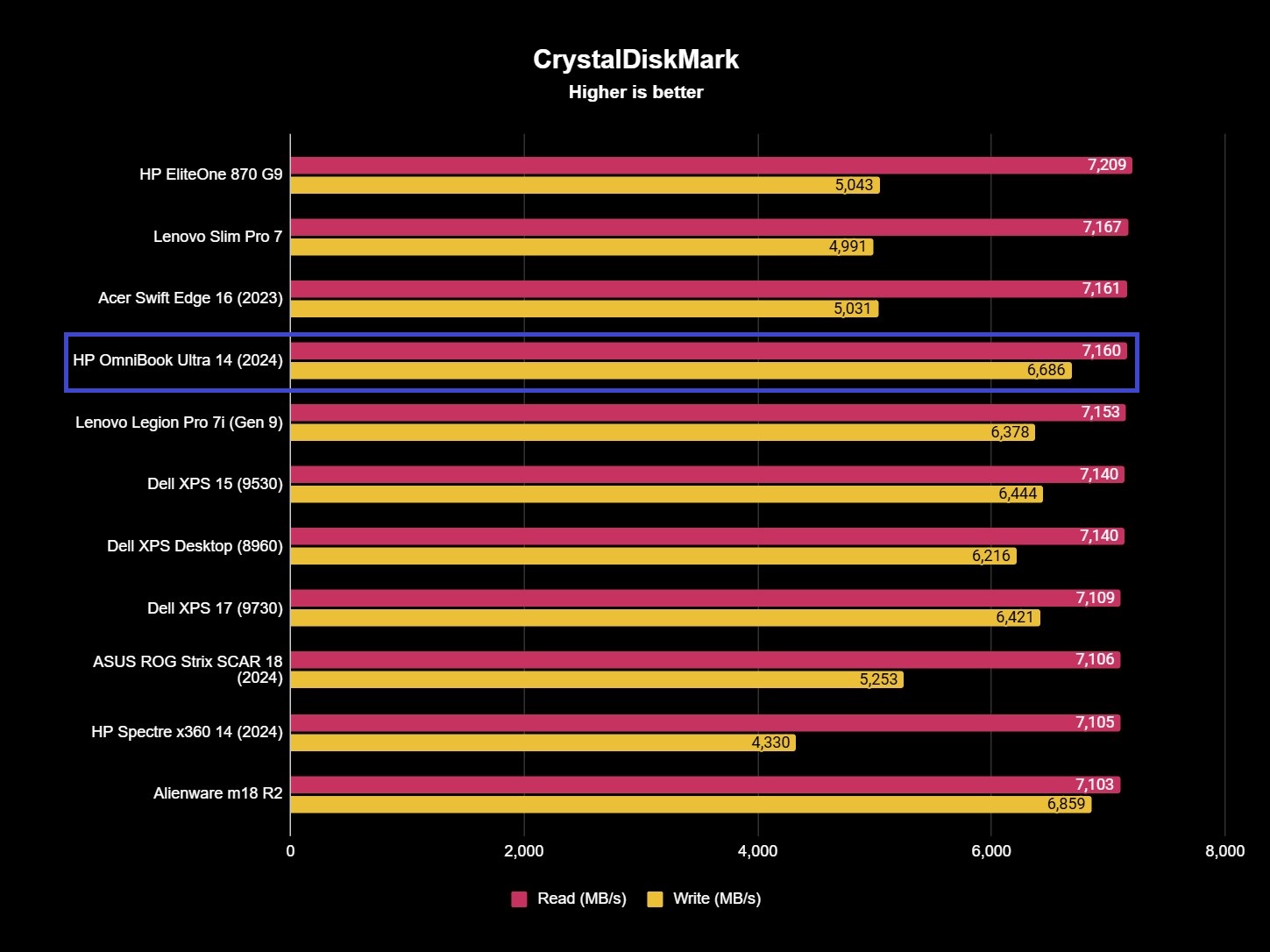
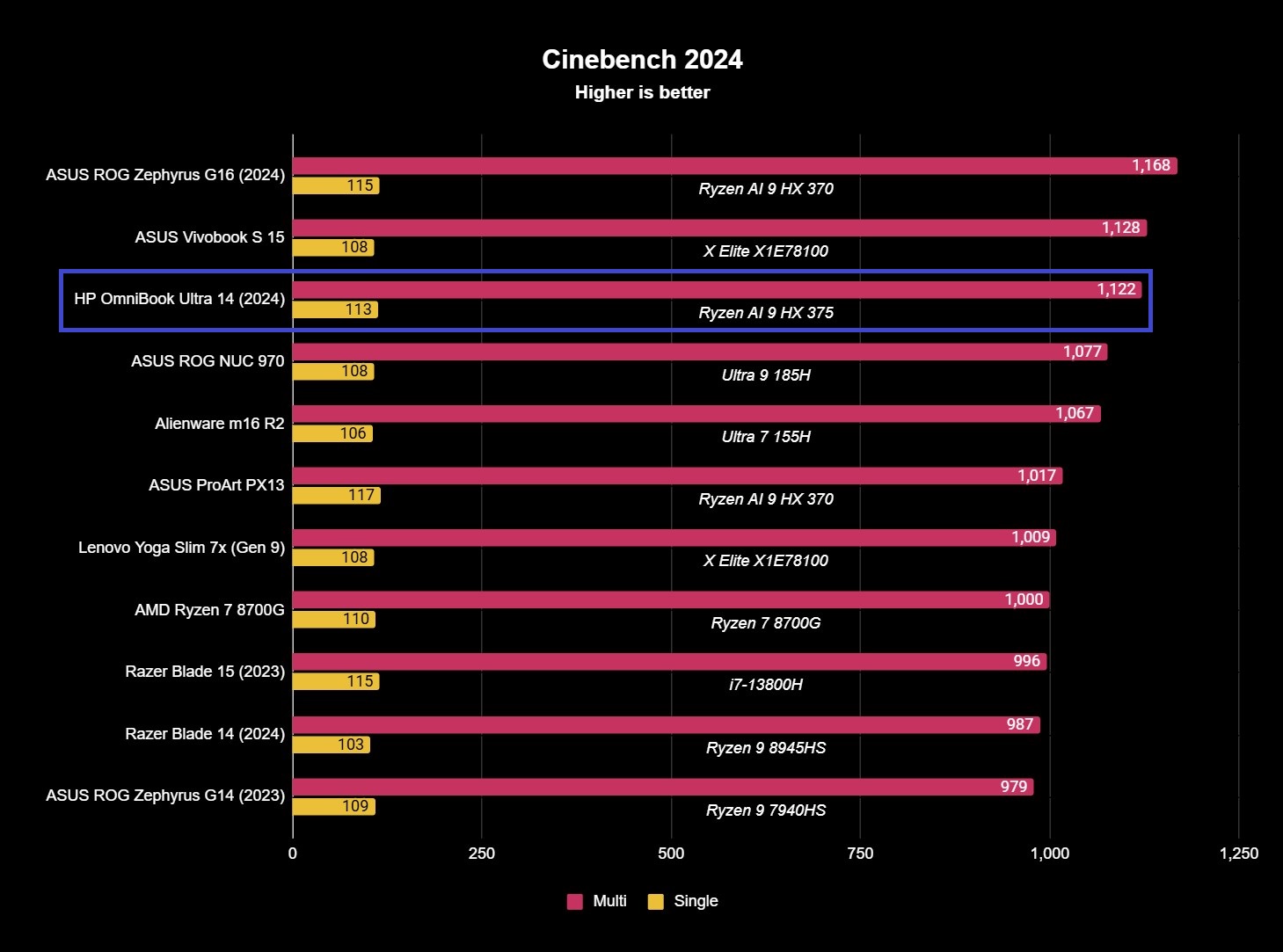
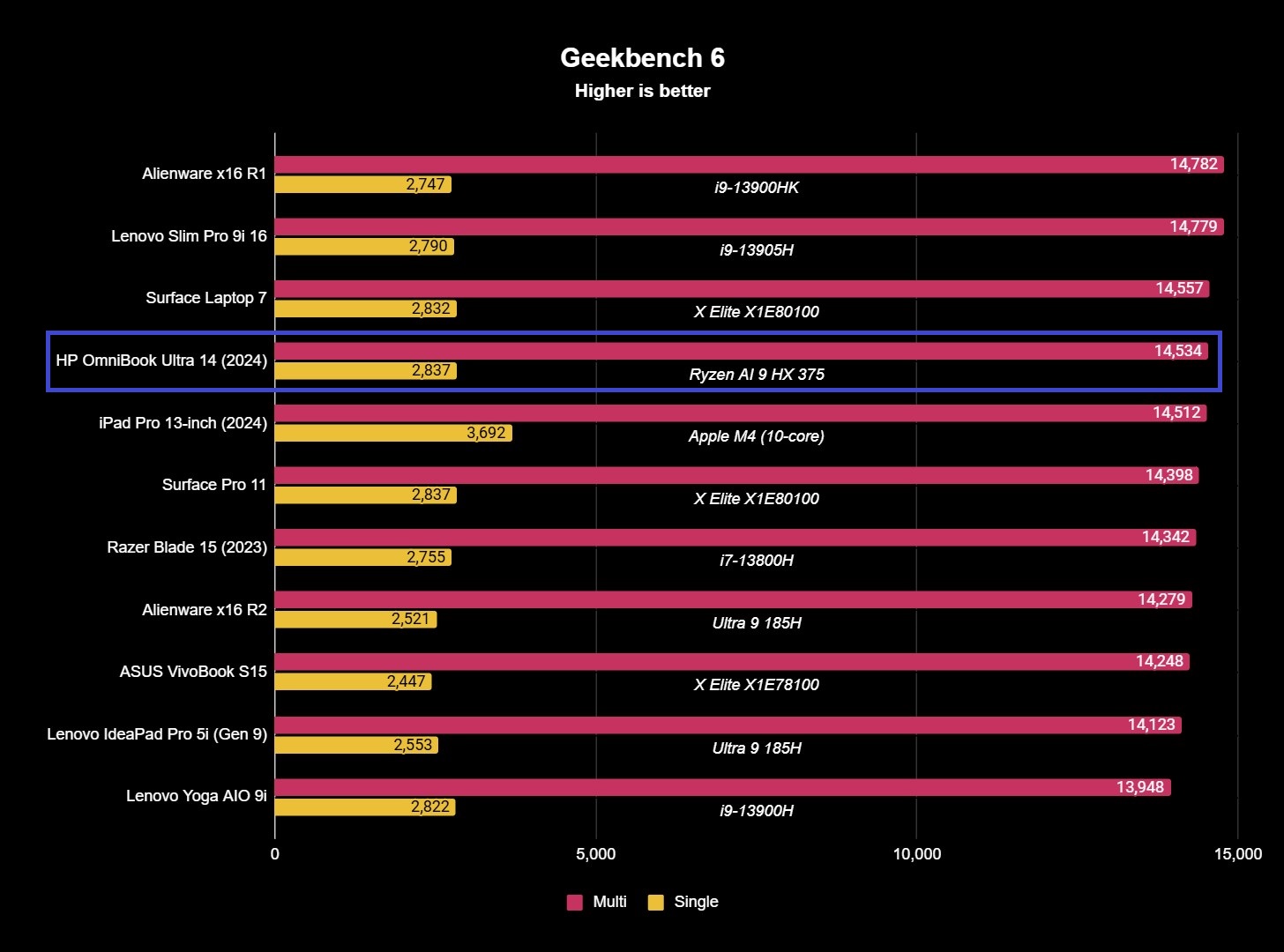
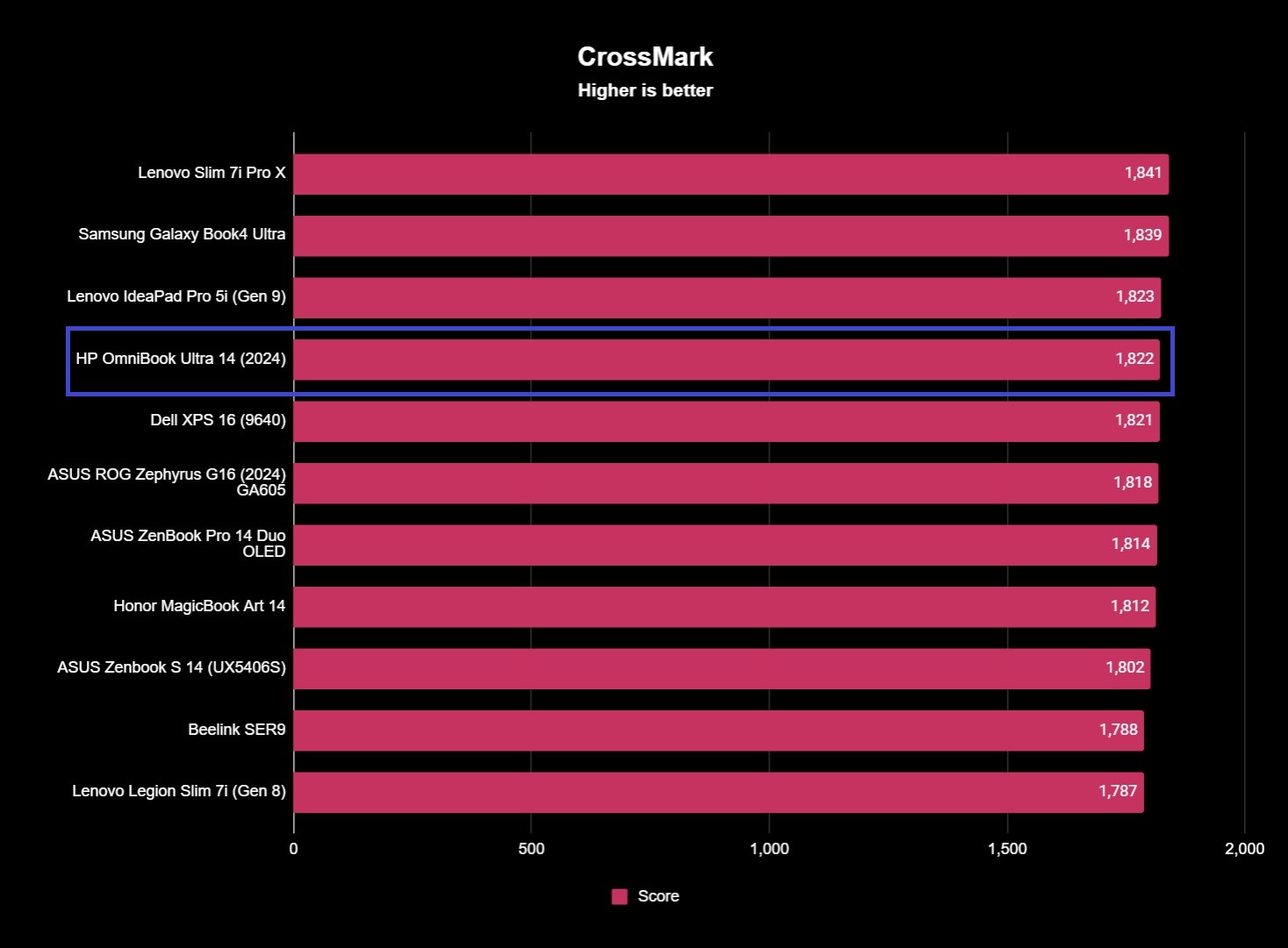
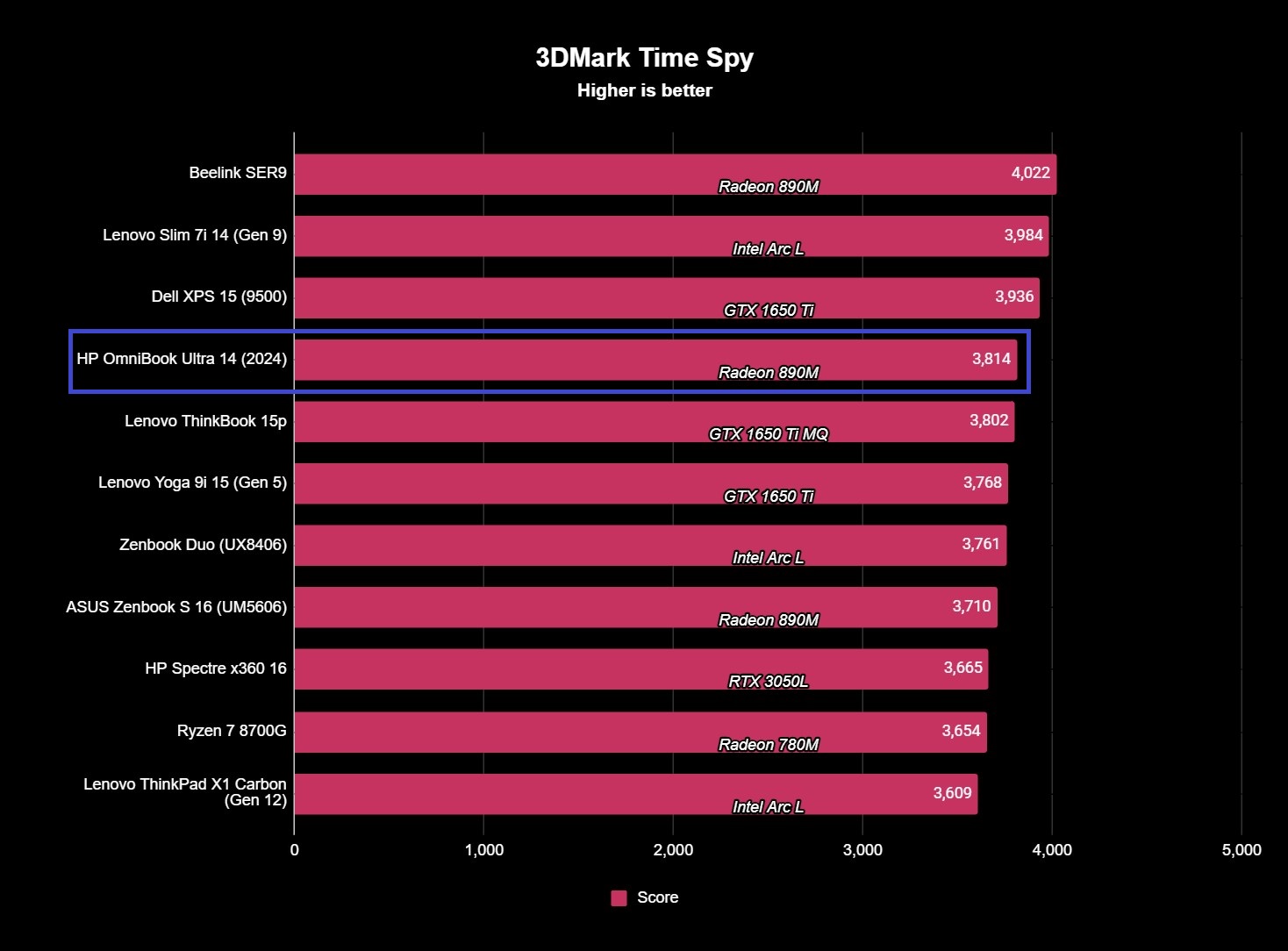
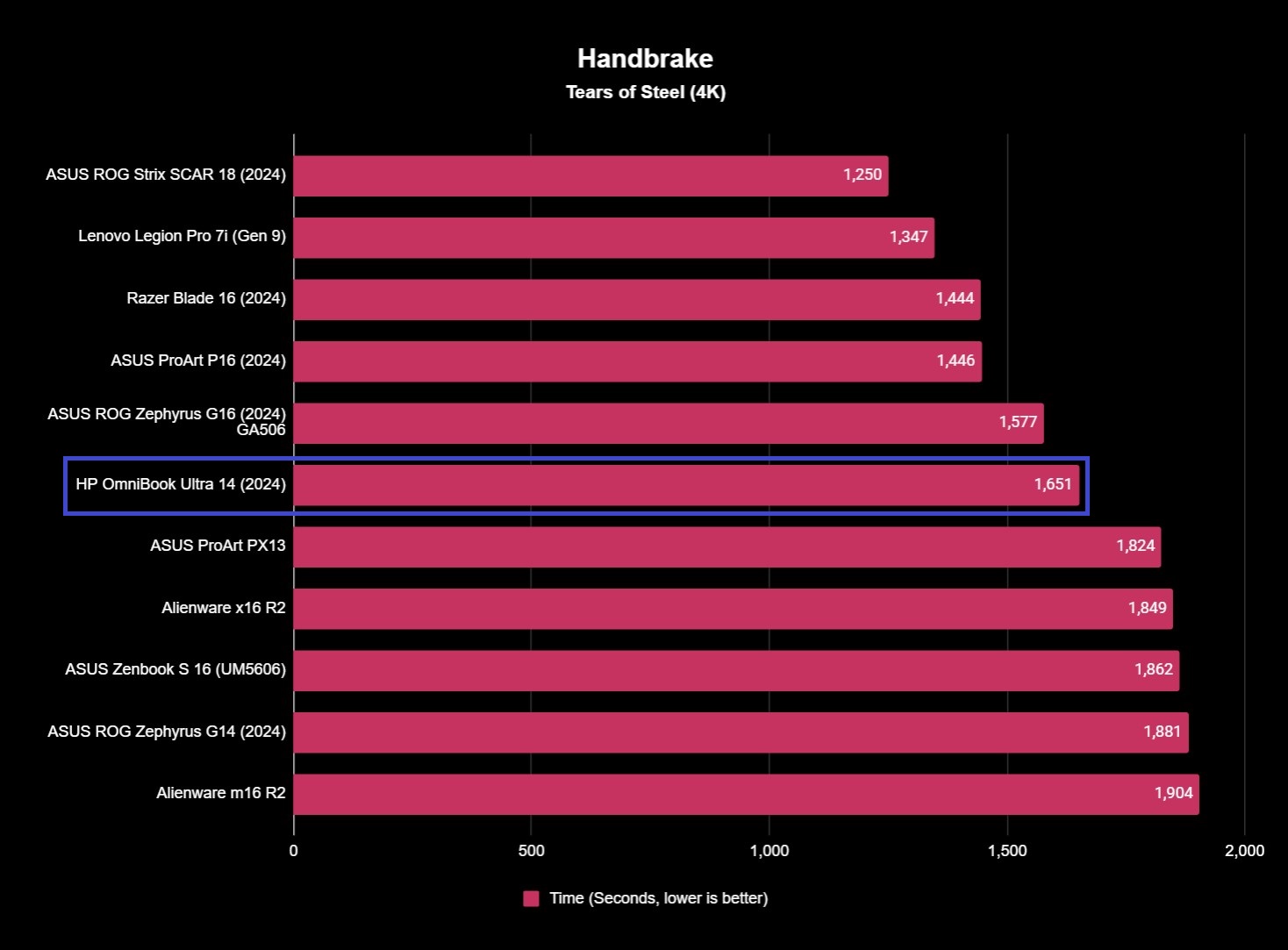
Any benchmark you run the OmniBook Ultra will reflect this performance, too. HP put in a blisteringly fast PCIe Gen 4×4 SSD inside this laptop to accompany the AMD Ryzen AI 9 HX 375 and its Radeon 890M graphics. It’s a potent combination that makes this one of the more responsive Ultrabooks I’ve used lately. The OmniBook Ultra is particularly adept at casual gaming and video encoding compared to a lot of other thin-and-light laptops.
The OmniBook Ultra may become quite hot to handle, particularly on its keyboard area, and you might notice the fans activating. However, these fans won’t produce a rattling or whining noise; instead, they’re almost inaudible. I didn’t experience thermal throttling with it, but larger laptops with more cooling capacity, such as the ASUS ProArt P16, deliver better continuous performance due to physics. I anticipate that the upcoming EliteBook X will extract even more performance from this chipset.
OmniBook Ultra 14: Software and AI experience
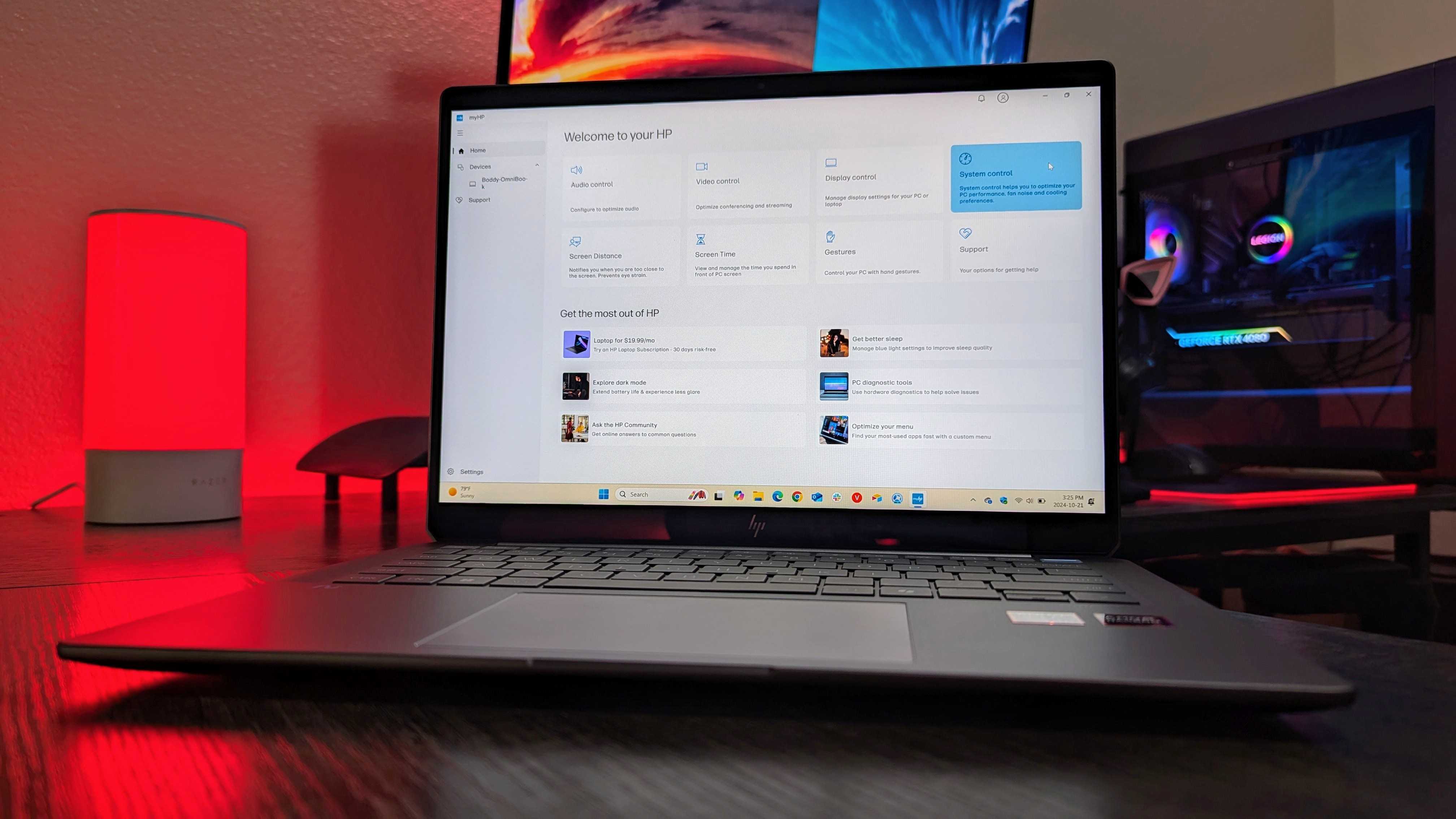
Software highlights
- The OmniBook Ultra runs either Windows 11 Home or Pro, and is a Copilot+ PC that’ll support all Microsoft’s AI features moving forward.
- This laptop also benefits from HP’s AI features and Wolf Security platform, which genuinely add value.
- However, HP still loads its consumer laptops with an unreasonable amount of bloatware and fragmented software.
- Software rating: ⭐⭐⭐⭐
This AMD chipset swiftly handles almost anything you give it, ensuring running Windows 11 is effortless. The OmniBook Ultra 14 is an efficient and dependable laptop suitable for both work and leisure, offering a delightful software experience. Moreover, the latest AMD hardware in this device classifies it as a Copilot+ PC that will continuously receive new AI features through Windows, leveraging its top-tier NPU technology.
As an analyst, I am excited about HP’s commitment to integrating advanced AI capabilities into their laptops, such as the HP AI Assistant, Print AI, and Smart Sense. While I believe that the full potential of AI in consumer laptops has yet to be realized, I am optimistic that HP is well-positioned to take advantage of this emerging trend.
The OmniBook Ultra is uniquely equipped with HP’s pioneering Wolf Security system, a significant advantage that positions it among the most secure consumer laptops available on the market. Furthermore, HP is transferring an increasing portion of its Wolf Security features onto the NPU, enhancing performance and efficiency without incurring additional costs due to this heightened security.
While HP’s consumer laptops offer many useful features, they continue to come with unnecessary software from third parties, and their own software is fragmented across multiple programs. This requires users to navigate through settings and the File Explorer just to have a clean Windows experience on a new laptop, which shouldn’t be necessary in today’s tech landscape.
OmniBook Ultra 14: Battery experience
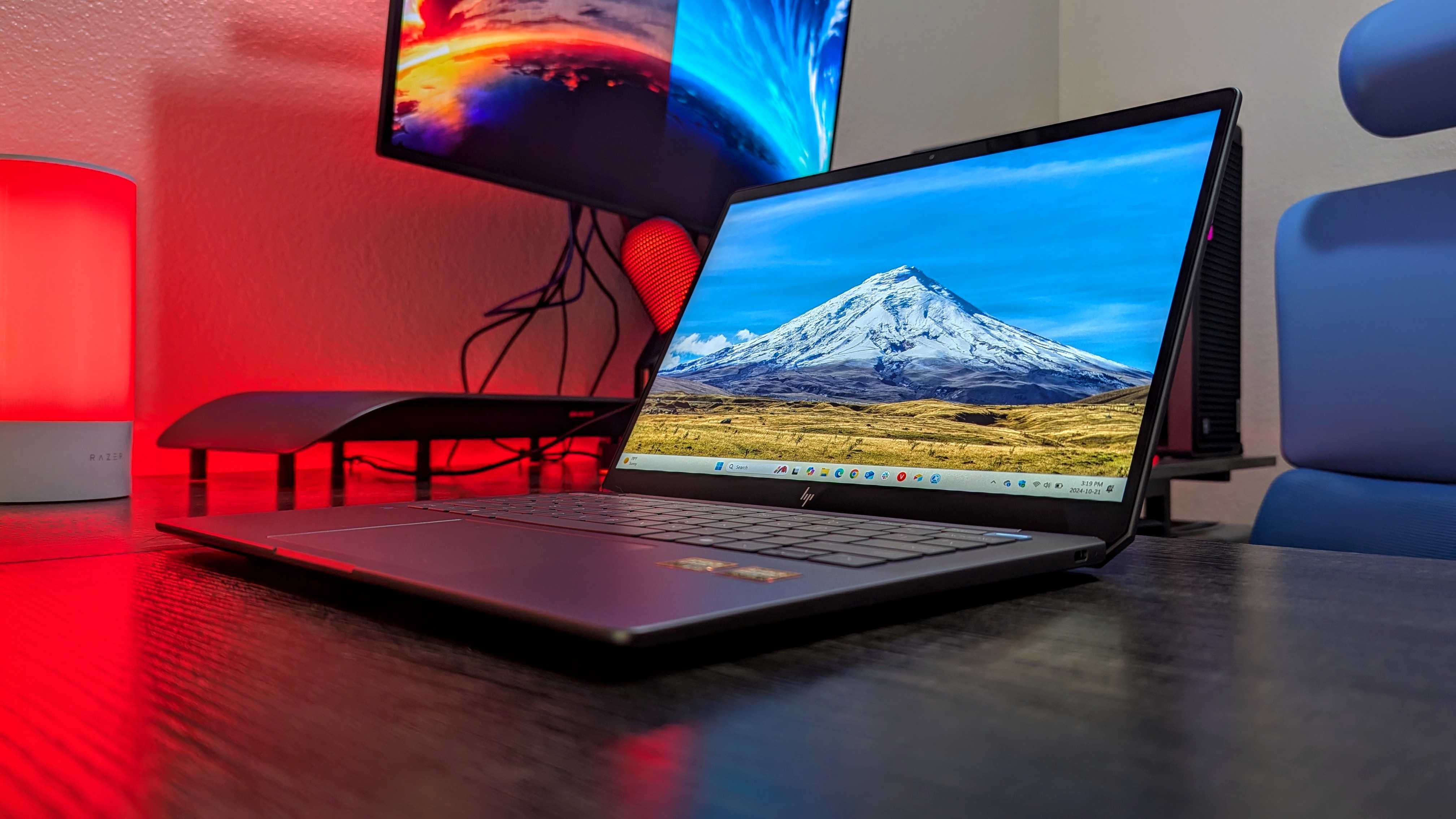
Battery highlights
- The OmniBook Ultra has endurance to revival the best ARM-powered Windows laptop, which is an impressive feat.
- Getting eight hours of real-world usage is a breeze with the OmniBook Ultra, even without compromising on features.
- An efficient processor and a low-power display certainly help with that endurance.
- Battery rating: ⭐⭐⭐⭐⭐
In my anticipation, I believed the HP OmniBook Ultra 14 (2024) would impress me with its performance, but instead, it took me by surprise with its remarkable battery life. The assertions about energy efficiency gains made by AMD in their Ryzen AI family are quite distinct from what I’ve observed in practice, yet the OmniBook Ultra has proven to be one of the longest-lasting laptops I’ve tested this year.
In Procyon, the OmniBook Ultra retained 94% and 95% of its performance respectively, during an hour-long run of general Office productivity tasks and HD video playback at half volume. These results are remarkable, partly because they benefit from the energy-efficient IPS LCD display that HP opted for in this model. Consequently, the OmniBook Ultra’s Ryzen AI 9 chipset can stretch its runtime significantly from the 68Whr battery.
Using the Windows Battery Report consistently demonstrates that the OmniBook Ultra never falls short in offering an entire day’s worth of productivity, regardless of high screen brightness, multiple tabs and applications running concurrently, background music, and extensive Wi-Fi usage. Today’s Windows laptops have significantly improved their longevity, yet the OmniBook Ultra persistently outperforms these advancements. Charging is effortless through either of its Thunderbolt 4 ports.
OmniBook Ultra 14: Keyboard and touchpad
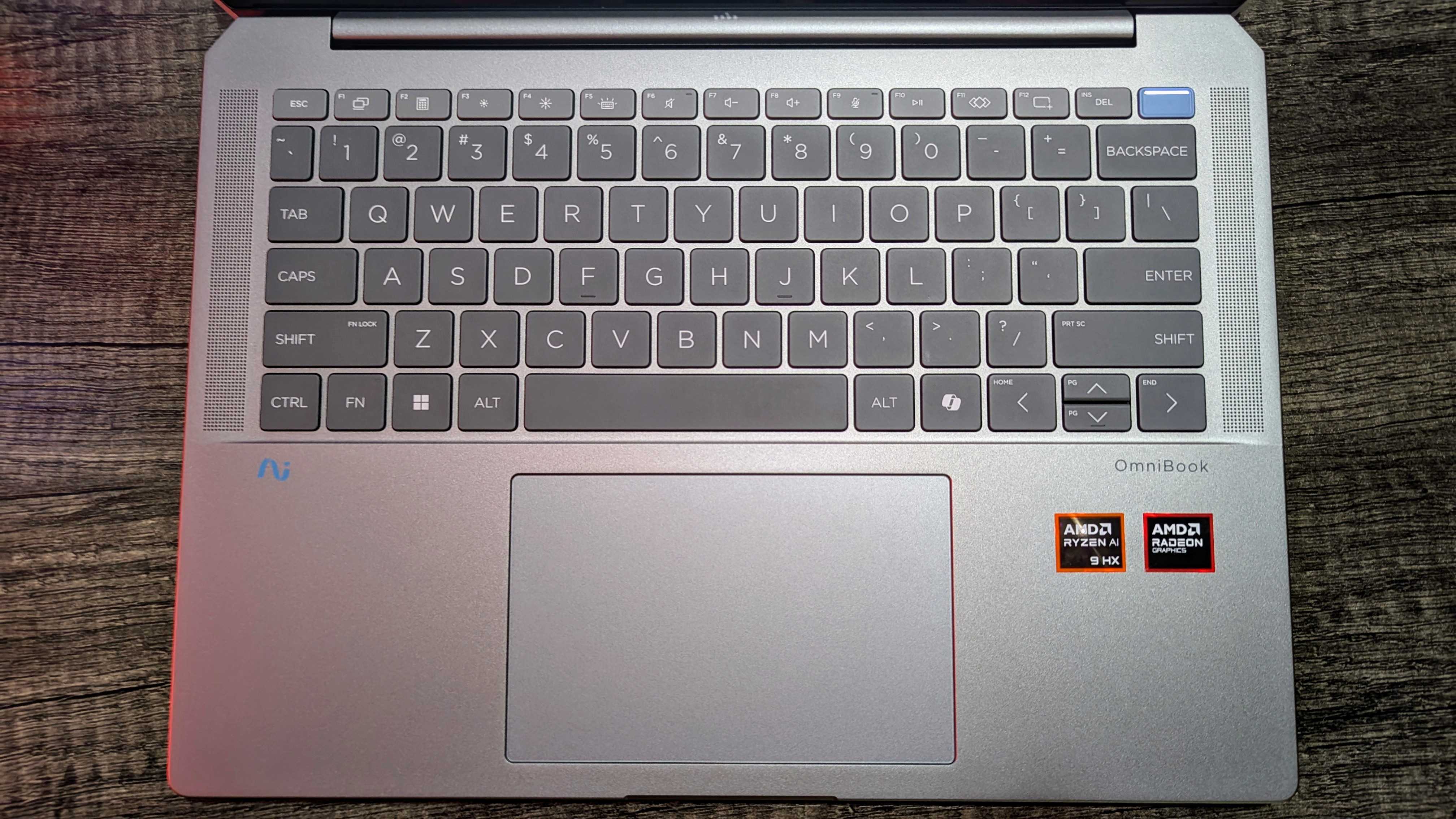
Keyboard highlights
- HP is among my favorite Windows OEMs when it comes to quality keyboards, and the OmniBook Ultra does feature a very nice keyboard.
- It’s certainly not my favorite from HP or other companies, but it’s a responsive and comfortable keyboard with a great layout.
- This glass touchpad is also great, although it could be larger and it could be haptic.
It’s amazing how complicated a great laptop keyboard really is, when you consider all the minute details that companies need to consider, and HP consistently counts among the best in this department the last few years. I will admit that the OmniBook Ultra 14 isn’t my favorite, even just from HP (that honor goes to the HP Spectre x360 14), but this is still an excellent keyboard.
This device boasts a clear, roomy, and user-friendly design. The keys are cozy and long-lasting. Their response is swift and uniform. Essentially, it has all the characteristics of an exceptional keyboard, although it lacks that special something to truly set it apart. Similarly, its touchpad performs well – sleek, glass, with Microsoft Precision drivers, providing a smooth, accurate experience. However, I do feel it could be slightly bigger, and I can’t help but yearn for top-tier laptops to incorporate haptic touchpad technology in the future.
OmniBook Ultra 14: Everything else
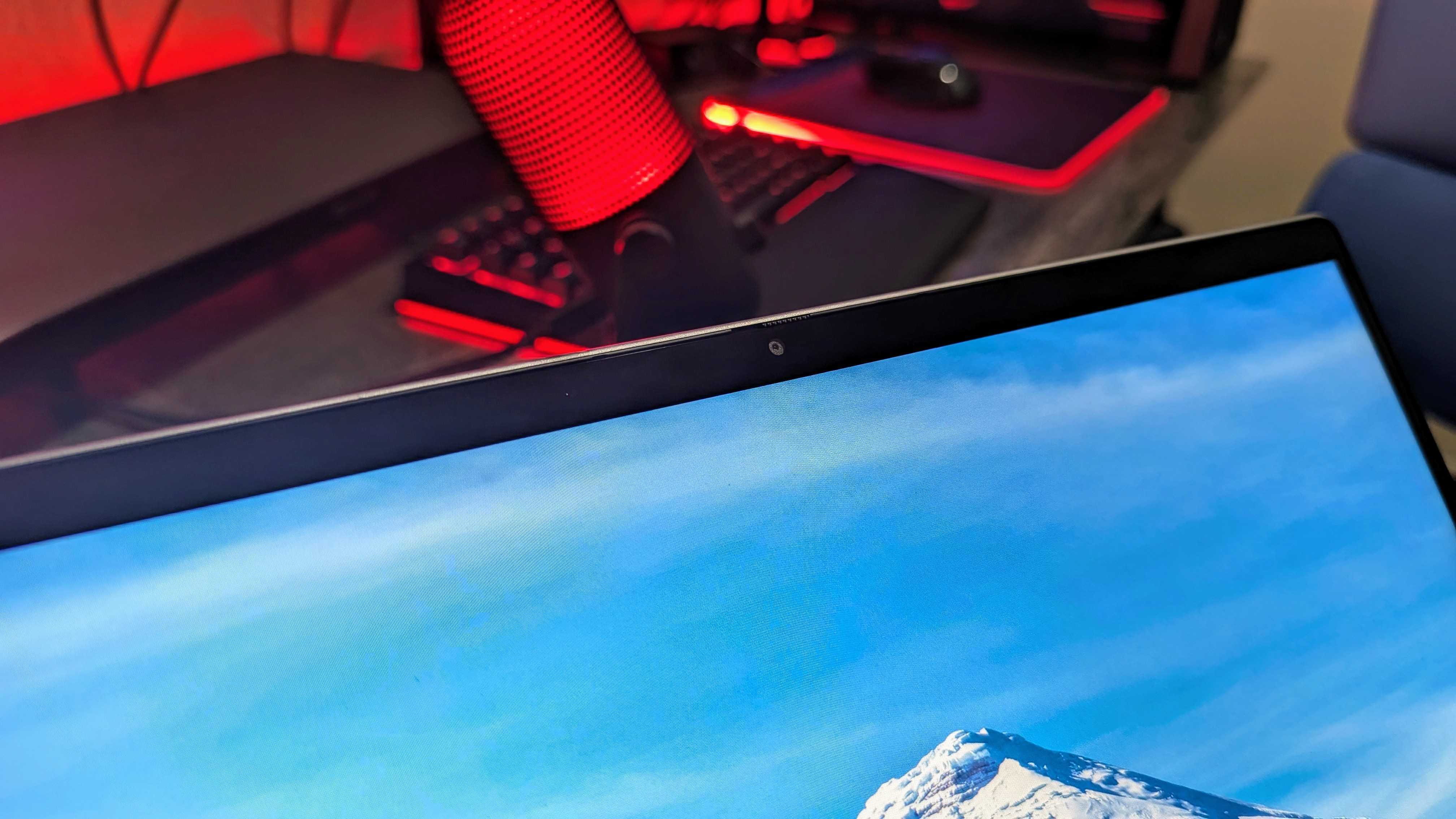
Other features highlights
- The OmniBook Ultra does hit all the fundamentals for a premium Windows laptop.
- The front-facing camera is better than most, the quad speakers are impressive, and wireless connectivity is excellent.
- A physical camera shutter, dedicated mic mute button, Windows Hello facial recognition, and the fingerprint sensor handle all your security and privacy needs.
- Other features rating: ⭐⭐⭐⭐½
Beyond its keyboard and trackpad, the HP OmniBook Ultra boasts features that match its high-end status.
This 9MP front camera offers a significantly higher resolution compared to most Windows laptops, featuring temporal noise reduction, a built-in dual microphone array, and Human Presence Detection (HPD) for advanced privacy and convenience features. Additionally, it comes with a physical camera shutter and a keyboard-mounted mic mute switch. Although the exposure and white balance may take time to adjust, once it does, the image quality is clear, detailed, and vibrant.
The quad speakers on this device are quite remarkable. They can get extremely loud without any issues such as distortion, muddiness, or tininess at high volumes. At present, ASUS has an edge over HP in terms of audio quality for Windows laptops, but it’s encouraging to see that more and more of these devices are getting their audio right. The speakers offer DTS:X Ultra surround sound, and the overall audio system and webcam have been fine-tuned by Poly Studios. It’s worth mentioning that the camera is backed by the Poly Camera Pro app, which leverages the OmniBook Ultra’s NPU and AI to enhance image quality at the camera level, ensuring excellent efficiency, performance, and compatibility.
Wi-Fi 7 and Bluetooth 5.4 are here for wireless connectivity, and I experienced zero issues with performance or stability. Windows Hello is also here for biometric authentication, and you don’t have to rely on the camera for facial recognition if you’re concerned about privacy — a fingerprint sensor is built into the power button. The OmniBook Ultra doesn’t have the most responsive biometric authentication, but it at least feels reliable.
OmniBook Ultra 14: Competition
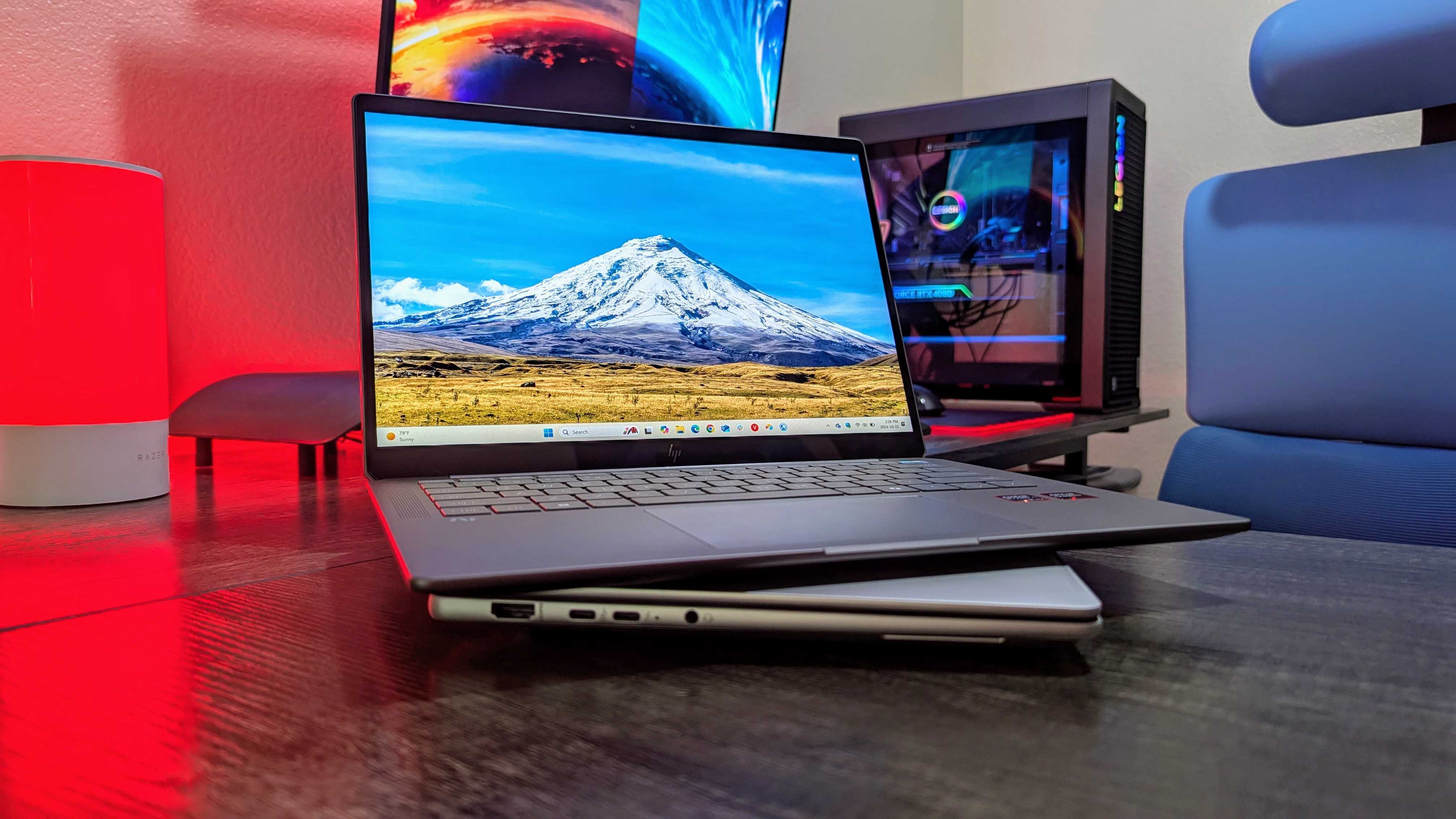
When it comes to comparing the HP OmniBook Ultra 14 to other Windows laptops, you have to consider what exactly you want. If you desire power in a slim and compact clamshell form factor, the ASUS ROG Zephyrus G14 (2024) is one of my favorite laptops. If you want the epitome of luxury, the Dell XPS 14 (9440) we reviewed simply can’t be beat.
In my opinion, though, one laptop in particular is the obvious alternative to the HP OmniBook Ultra right now, and that’s the HP OmniBook Ultra Flip 14. A slightly higher starting price nets you an Intel Core Ultra (Series 2) chipset, a phenomenal OLED display, a more versatile 2-in-1 form factor, and some of the best laptop design in the business. I haven’t reviewed this laptop (yet, I have it here in my office), but my early impressions immediately make it the more exciting laptop. However, it’s not as powerful as the OmniBook Ultra 14.
If you’re targeting that particular style, it might be beneficial to hold off until the HP EliteBook X (G1a), set to release this year. The PRO version of its AMD Ryzen AI chipset, boasting a more appealing and contemporary design, an advanced display, and additional ports, makes the EliteBook X a highly intriguing laptop option.
OmniBook Ultra 14: Final thoughts
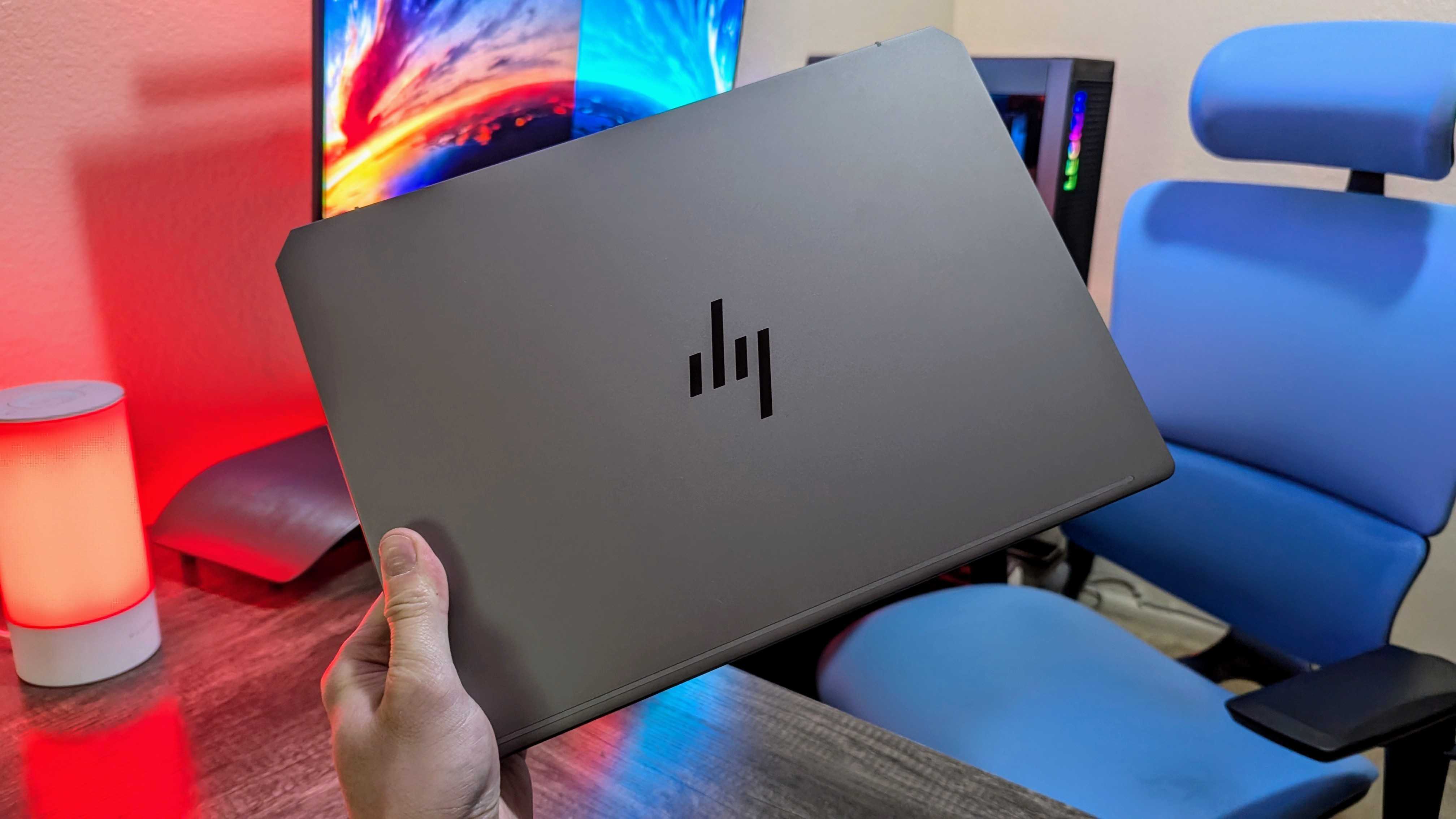
You should buy this if …
✅You want an Ultrabook with above-average performance and endurance
The HP OmniBook Ultra 14 boasts impressive performance due to AMD’s advanced Ryzen AI processors, and it truly delivers on this promise with smooth and dependable functionality. Additionally, it offers long-lasting battery life, making it ideal for all-day use. While other aspects may fall short, these two key features are effectively met.
✅You prefer a laptop that doesn’t stand out
Regarding design, screen, and overall groundbreaking features, the OmniBook Ultra can be described as rather traditional; however, it caters well to users who seek a laptop with top-tier performance but without the flashy, high-end aesthetic often associated with premium devices.
You should not buy this if …
❌You want a laptop that justifies its price point on every front
The OmniBook Ultra functions exceptionally well as if it were an ultra-luxury device, but it lacks the tactile sensation to reflect its high price tag. If you desire a laptop that consistently conveys its value through its feel, the OmniBook Ultra might not meet your expectations.
Over time, I’ve developed a stronger affection for Lenovo and ASUS due to their innovative spirit in experimenting with fresh designs and expanding the possibilities of what a contemporary Windows laptop can offer. In contrast, HP seems to be taking a more cautious approach to laptop design, as evident in the OmniBook Ultra 14.
The OmniBook Ultra is constructed on a robust base that can withstand any challenge. The AMD Ryzen AI 9 HX 375 processor, known for its exceptional performance, will continue to be remarkable even during the upcoming era of AI PCs. This chipset significantly contributes to ensuring the laptop’s durability, allowing you to confidently use it throughout entire workdays without concern. Furthermore, the inclusion of Thunderbolt 4 ports caters to AMD enthusiasts, while the emergence of HP’s Wolf Security platform on a consumer device is an underestimated advantage for all users.
Regarding the OmniBook Ultra, despite its satisfactory tertiary features like touchpad, webcam, speakers, and more, it only meets the basic requirements for a laptop priced at $1,350 and above. However, I can’t ignore the uninspiring design and average display quality, which significantly detract from the overall user experience and don’t align with its price tag. Given that it starts at $1,349.99 on HP, a higher level of sophistication might be more appropriate.
My final verdict? This is a great laptop… But it’s boring.
Read More
2024-10-23 16:10